
How good are we at recognizing the limitations to our knowledge? Tenelle Porter, a former postdoctoral scholar in human development at UC Davis, studies the concept of intellectual humility.
What is intellectual humility?
According to Porter, it is the ability to admit when you don’t know something and a willingness to learn from others. “Acknowledging or recognizing your intellectual limitations, and appreciating other people’s intellect, is essentially intellectual humility.”
She added that intellectual humility can be measured through people’s actions and their thought processes. An intellectually humble person will admit when they are not knowledgeable about a topic, whereas a person who lacks intellectual humility will choose to act condescendingly and deny their lack of knowledge.
“It’s important to voice your opinion and be able to properly build your own intellectual confidence. It is also important to know the limitations of your perspective; none of us are all-seeing or knowing. Intellectual humility is about valuing truth. Through my research, I’m hoping to bring intellectual humility into learning environments,” said Porter.
Where the idea originated
The concept of intellectual humility has been discussed by philosophers since the 1800s. Porter first became interested in it when she was a graduate student.
“I started to notice that people who were more humble in regards to their education actually learned more,” Porter said. “I even felt safer expressing my own opinions with humbler professors, and I found that as a collective we all benefited from it.”
Can anyone become intellectually humble?
The answer depends, she said. “If someone is in a cutthroat field, it can be a social contest, and people may find it harder to be intellectually humble for the fear of looking incompetent,” said Porter.
She noted that groups that are often underrepresented — such as women, people of color and first-generation college students — can face more barriers in expressing intellectual humility than others.
“Women in math and science may feel reluctant to admit that there are things that they don’t know because doing so risks confirming negative stereotypes,” said Porter.
But, she noted, if someone is willing to open themselves to learning, they are practicing intellectual humility.